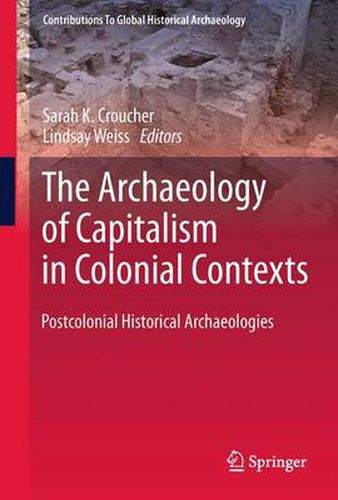Readings Newsletter
Become a Readings Member to make your shopping experience even easier.
Sign in or sign up for free!
You’re not far away from qualifying for FREE standard shipping within Australia
You’ve qualified for FREE standard shipping within Australia
The cart is loading…






This title is printed to order. This book may have been self-published. If so, we cannot guarantee the quality of the content. In the main most books will have gone through the editing process however some may not. We therefore suggest that you be aware of this before ordering this book. If in doubt check either the author or publisher’s details as we are unable to accept any returns unless they are faulty. Please contact us if you have any questions.
The Archaeology of Capitalism in Colonial Contexts: Postcolonial Historical Archaeologies explores the complex interplay of colonial and capital formations throughout the modern world. The authors present a critical approach to this topic, trying to shift discourses in the theoretical framework of historical archaeology of capitalism and colonialism through the use of postcolonial theory. This work does not suggest a new theoretical framework as such, but rather suggests the importance of revising key theoretical terms employed within historical archaeology, arguing for new engagements with postcolonial theory of relevance to all historical archaeologists as the field de-centers from its traditional locations.
Examining case studies from North America, South America, the Caribbean, Africa, Australia, the Middle East, and Europe, the chapters offer an unusually broad ranging geography of historical archaeology, with each focused on the interplay between the particularisms of colonial structures and the development of capitalism and wider theoretical discussions. Every author also draws attention to the ramifications of their case studies in the contemporary world. With its cohesive theoretical framework this volume is a key resource for those interested in decolonizing historical archaeology in theory and praxis, and for those interested in the development of modern global dynamics.
$9.00 standard shipping within Australia
FREE standard shipping within Australia for orders over $100.00
Express & International shipping calculated at checkout
This title is printed to order. This book may have been self-published. If so, we cannot guarantee the quality of the content. In the main most books will have gone through the editing process however some may not. We therefore suggest that you be aware of this before ordering this book. If in doubt check either the author or publisher’s details as we are unable to accept any returns unless they are faulty. Please contact us if you have any questions.
The Archaeology of Capitalism in Colonial Contexts: Postcolonial Historical Archaeologies explores the complex interplay of colonial and capital formations throughout the modern world. The authors present a critical approach to this topic, trying to shift discourses in the theoretical framework of historical archaeology of capitalism and colonialism through the use of postcolonial theory. This work does not suggest a new theoretical framework as such, but rather suggests the importance of revising key theoretical terms employed within historical archaeology, arguing for new engagements with postcolonial theory of relevance to all historical archaeologists as the field de-centers from its traditional locations.
Examining case studies from North America, South America, the Caribbean, Africa, Australia, the Middle East, and Europe, the chapters offer an unusually broad ranging geography of historical archaeology, with each focused on the interplay between the particularisms of colonial structures and the development of capitalism and wider theoretical discussions. Every author also draws attention to the ramifications of their case studies in the contemporary world. With its cohesive theoretical framework this volume is a key resource for those interested in decolonizing historical archaeology in theory and praxis, and for those interested in the development of modern global dynamics.